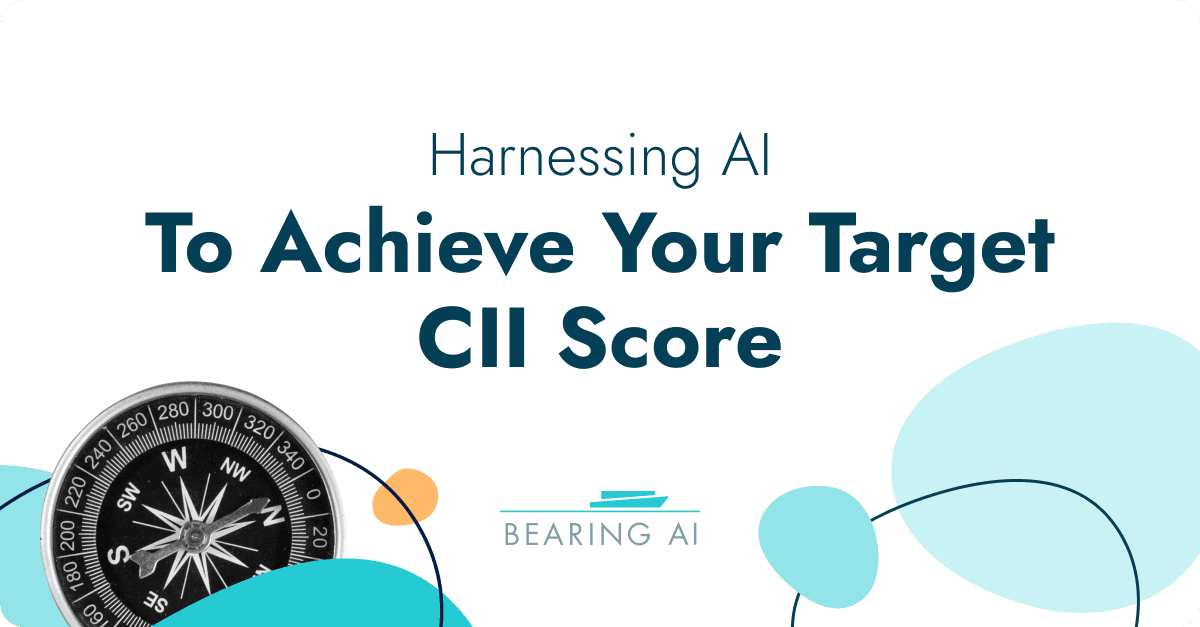Harnessing AI to Achieve Your Target CII Score

The maritime shipping industry stands on the cusp of a digital revolution, with Artificial Intelligence (AI) steering toward a more sustainable and efficient future. As shipping professionals, there is a collective recognition that meeting the Carbon Intensity Indicator (CII) ratings is not just a regulatory requirement but an imperative step in reducing the environmental footprint of our fleets. But how can AI, and particularly platforms like Bearing AI, be harnessed to ensure vessels meet their target CII Ratings? This blog post explores the potential of AI in shaping the course towards greener maritime practices.
What is the CII, and Why is it Crucial?
The CII measures how efficiently a vessel transports goods or passengers, expressed in grams of CO2 emitted per cargo-carrying capacity and nautical mile. Introduced as part of the International Maritime Organization's (IMO) strategy, the CII is a metric used to steer the industry towards its ambitious 2030 and 2050 decarbonization targets. The CII rating of a ship impels operators to adopt cleaner, more fuel-efficient ships and operational practices, fostering innovation and responsibility in a traditionally carbon-heavy sector.
AI's Role in Meeting CII Ratings
Energy Efficiency Optimizations
AI is adept at processing vast quantities of data to find patterns that elude human analysis. For shipping, AI algorithms can constantly monitor and analyze vessel operations to suggest adjustments that conserve fuel. Whether it's optimizing routes to avoid harsh weather conditions, adjusting speeds to reduce resistance, or suggesting energy-saving maneuvers, AI champions smarter sailing that aligns with stringent CII ratings.
Vessel Performance Monitoring
Continuous monitoring is key to understanding a vessel's operational profile and improving it. AI platforms excel at tracking a ship's performance in real-time, considering variables such as sea state, load, and fuel quality. By leveraging the insights provided by AI monitoring, shipping companies can make data-driven decisions that enhance overall efficiency and meet or surpass the required CII standards.
Optimized Fleet Deployment
AI solutions like the Bearing AI Fleet Deployment Optimizer can accurately predict and optimize fleet emissions within the context of an entire vessel schedule.
Using this tool, shipowners and operators can upload fleet deployment schedules directly to the platform to see immediate CII performance predictions for each vessel. This tool can forecast future conditions and demands by analyzing historical and real-time data, enabling operators to make proactive decisions that minimize fuel consumption and CO2 emissions.
AI algorithms can allocate vessels to routes where they can perform optimally, considering the anticipated CII rating impact. This ensures compliance with environmental regulations and significantly improves the operational cost-effectiveness of the entire fleet.
Through these advanced AI-driven optimizations, each vessel's contribution to the fleet's overall carbon footprint can be strategically managed, paving the way for a harmonious balance between economic and ecological objectives.
The Bearing AI Advantage
With tools like Bearing AI, shipping professionals can gain unprecedented insight into their fleets. Bearing AI synthesizes complex datasets into actionable intelligence, enabling ships to operate efficiently. Integrating this technology means that companies can consistently track their CII ratings and adapt as necessary to ensure compliance with IMO regulations.
It is an era where advanced technology is indispensable for achieving sustainability in maritime shipping. AI's applications in predictive maintenance, energy efficiency optimizations, and vessel performance monitoring are pivotal in navigating the turbulent waters of carbon intensity reduction. Companies leveraging platforms like Bearing AI will find themselves at the helm, leading the industry towards a greener horizon.


 Back To Blog
Back To Blog